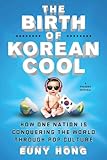
The Birth of Korean Cool: How One Nation Is Conquering the World Through Pop Culture
- 作者: Euny Hong
- 出版社/メーカー: Picador USA
- 発売日: 2014/08/05
- メディア: ペーパーバック
- この商品を含むブログ (3件) を見る
Euny Hong The Birth of Korean Coolからメモ。
所謂K-POP*1の非韓国性(ヨーロッパ性)について。韓国の文化批評家Lee Moon-wonの言葉。”Koreans are not good at creativity.”ということで、
また、K-POPはロックの遺産を継承していない(空白の1970年代)。Euny Hongによれば、それは朴正熙独裁政権の遺産でもある。曰く、
Sitting across from him, my eyes widened and I asked him to elaborate. “Koreans are better at packaging and marketing. Look at Samsung, for example. With K-pop, the songwriters are not Korean. They're European. The people who do editing studied in the United States; they're multinational. The dance choreographers are from everywhere. It's really a factory.”
Many of the songwriters are European―Swedes especially. “Korean pop is based on Europop,” Lee explained. Which totally explains why K-pop songs sound like Eurovision Song Contest entries. He elaborated, “The European sound influence is electronic and techno music. There's a heavy electronic base.” (pp.107-108)
There's a very good reason for the lack of an original, homegrown Korean sound: the Korean pop scene got a very late start because of censorship that stifled musical talent and creativity. For a critical period during the 1970s, rock music was banned in Korea.
As a consequence of this ban, the Korean pop sound progression, including classic rock, punk, glam rock, and early heavy metal. No Led Zeppelin, No Sex Pistols, no David Bowie. (p.108)
Park's iron-fisted politics were partly in response to North Korea, which was putting most of its resources into building its military; this made South Korea extremely nervous. In 1972, Park responded to the threat of invasion as any sensible ruler would: by bannning mniskirts, long hair on men, and rock 'n' roll. That pretty much ruled out mods, rockers, and hippies―imminent threat to national security.
Police would stop women on the streets, take a ruler to their slirts, and force them to go home and change if the gap between the hemline and the knee exceeded twenty centimeters. They would grab long-haired men and cut off their hair on the spot. No doubt these tactics will go down in the annals of history a the most effective war prevention gesture of all time. I7m sure that the North Korean rulers were quivering in their boots when they got wind of it.
Wi Tack-whan, head of the Korean Culture and Tourism Institute, recalled, “You couldn't have English words on your clothes or you'd get arrested. Even if you carried a guitar around, they would take it away. Songs were a way of protest.” (pp.108-109)